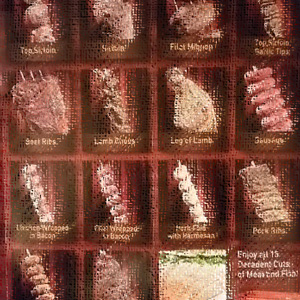A guy in an intentionally faded T-shirt and a camouflage jacket talks to Ms. Nebraska. Perhaps he can regale her with his tales of adventure and courage in which he climbs trees, hides, and then blows away those vicious deer.
Bellowing and clapping from the other side of the bar. On the TV, a grown man in tight clothes and a helmet dances while hoisting a ball made of dead cow. The bartender puts a stuffed dragon on a shelf. I’m surprised it’s not real. It holds a chalkboard that says, “Franklin’s Spring Ale/Bottles/$1.50.”
They cheer and several order. Chalky Hands even gets one. The light clutches a couple strands of hair that wick up in the middle of his head.
Text: “Should have brought my bifocals and wig.”
Timmy leaves to make room for more ale.
“Say . . .” Chalky Hands holds his pen like a cop holding a flashlight. “Now that thingy, I imagine that’s pretty nifty, huh?”
Yeah, Henry. It could hold ten thousand times the content of that monster you’re lugging around. “Sure.”
The bartender asks me if I’m interested in the “touchdown special.”
Good sir, I thank ye kindly. Alas, I fear that imbibing that libation would leave me with a paunch much like those of the knaves that surround your bar. I hold up my hand and shake my head no.
The lights dim. Though I’m sure that the intent is to project intimacy, the reality is that it projects butchery.
Chalky Hands sticks his nose in his book, takes a big whiff. “Ahhh. The smell of books. You like the smell of books?”
It’s actually how I choose my books. I walk into bookstores blindfolded, then get the books that smell best. “Eh.”
He’s the type of guy who sees a consummate work of contemporary architecture and says, “It’s just a big box,” or “It looks too expensive,” and then rips into a hot dog.
“Look here.” He rotates the monster. “No batteries.”
I gesture around the bar. “Dark.” I turn on my phone. “Bright.”
“I’ll be . . . I saw that one. Right over here.” He recognizes the image of the new Hyde Park bank on my phone. Stainless steel. Concrete. Glass. Precise. “I see that Sullivan’s influence in there. Sullivan. You know Sullivan?”
Will these Sullivan references ever stop? “Guy’s been dead for like eighty years.”
“Sure. But it’s . . .” The chalky hands flatten, face each other, as if he’s showing me the length of something. Then they shift to a height measurement. “Ah, what do you call that?”
“Composition?”
“Right, right. Composition. Some of Sullivan’s stuff was like that, right? Funny how you see bits of history. How they just pop out sometimes?”
“It’s well-composed.”
“We learn from them, they learned from the folks before them. Everything’s all kind of stacked.” He takes out a phone, then places it on his book. The phone is a PM5.
The bartender sets a Franklin’s Spring Ale before me. “Try it. On the house.” But I need to grow a mustache and chop me some wood before I drink that.
The bottle’s label shows a figure on a path that winds to a rising sun. Maybe it’s the snot rocket guy from Nebraska. I’ll probably take it into the bathroom, dump it.
Chalky Hands takes a swig of his. “Say, that’s familiar. You taste this? It tastes familiar.”
The path on the bottle is silver and it reflects light. Maybe that’s Timmy’s father on the path. His final run. The path leads right up to that orange sun. A faded orange, like a robin. Those things used to wake me when I was a kid. You don’t hear them in the city so much.
Perhaps there are robins at the dog park.
My girlfriend texts: “Warp back home soon?”
A gaucho passes with a meat-heaped spear. Chalky Hands reads by cell phone flashlight. I’m surprised it’s not candlelight. Ms. Nebraska shows camouflage guy something on her phone.
This is Chicago, where one day all the steel and the concrete stomp on you and all the edges slash at you, and the next day, a man jumps into the river to save an old woman’s dog.
Timmy returns, dials his invisible rotary phone. “Hey Sprouts, I never seen Nu. You got a snapshot or something?”
I think about telling him the photos are still developing in the darkroom. Instead I show him Nu on my Forzy.
“Boy, he looks like a fun wild guy.”
But Nu isn’t wild. He’s probably more discerning than Timmy.
Timmy, humming, pulls out his wallet, shows me a picture of a mutt. “He’s not this dark. He’s a lot lighter.” He scans the bar, points to the path on the bottle of Franklin’s Spring Ale. “Here. A lot like this here.”
“Nice.”
Timmy takes off his hat. The hair above his ears makes his head look like an old-fashioned alarm clock. “Boy, last week? Hunter? I’ll tell ya, last week . . .” His eyes redden and his voice quavers. “I had to have him put down. That’s . . . I’ll tell ya, you have him every day for twelve years . . .”
He sips his ale, and I try mine, and somewhere, a robin’s chirp curves around a box of glass and steel.
I used to eat meat. And when Timmy’s father went down, cell phones didn’t exist.
I text my girlfriend: “I’ll be here awhile.”


